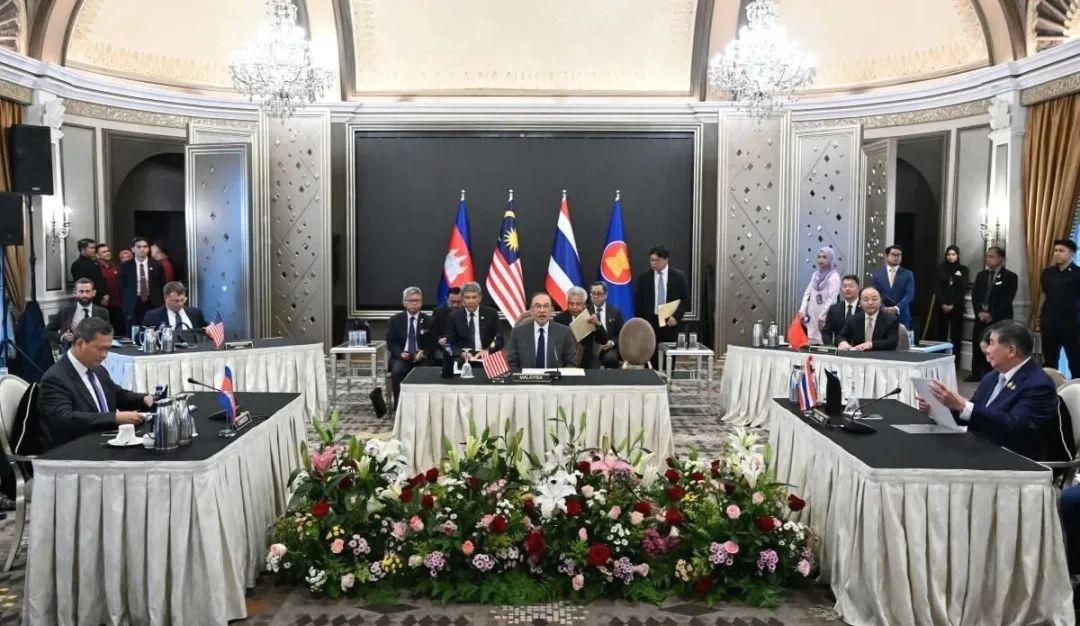Eric's Insight: Regionalism prevails in Cambodia-Thailand truce
After five days of intense fighting that displaced over 300,000 people, Thailand and Cambodia reached a truce agreement that came into effect on July 28, halting the deadliest conflict between the two ASEAN neighbors in more than a decade. This outcome highlights the power of regionalism in bringing the relevant parties to the table for international mediation.

Malaysia, chair of the ASEAN regional bloc, China and the United States bring Thailand and Cambodia to the table for talks. Online photo
Regionalism refers to a strong sense of pride or loyalty that people within a region feel toward that region, often coupled with a desire for self-governance. News photos from the negotiation site showed that the Cambodian Prime Minister Hun Manet and Thai acting Prime Minister Phumtham Wechayachai engaged in talks presided over by Malaysian Prime Minister Anwar Ibrahim, with the presence of Chinese and U.S. representative officials.
Competent ASEAN rotating chair
Placing great importance on resolving regional conflicts through peaceful means like negotiation, ASEAN has been embracing regionalism since its inception in 1967. Currently, ASEAN is arguably one of the most exemplary international organizations where regionalism is clearly evident.
Both Thailand and Cambodia are ASEAN members, and the Thais and Cambodians share a strong loyalty for the Southeast Asian region as well as a desire for self-governance within the ASEAN framework. This is why the Malaysian Prime Minister, chair of the ASEAN regional bloc, was able to invite the leaders of Thailand and Cambodia to Putrajaya, the administrative capital of Malaysia.
By promptly bringing Thailand and Cambodia together for peace talks, Malaysia has demonstrated its competence in fulfilling its due role as the ASEAN rotating chair. Moreover, Malaysia’s arrangement for the peace negotiation was thoughtful in that it included representative officials of China and the U.S.-- the key regional players.
Influential actors in regional affairs
Both China and the United States are highly influential countries in the Southeast Asian region. As a global economic and technological powerhouse, China shares immediate overland borders with several ASEAN states like Myanmar, Laos, and Vietnam. It has also maintained amicable relations with both Cambodia and Thailand.
From the perspective of broader regionalism, China and ASEAN belong to the same Asian region. China has long supported ASEAN’s central role in addressing regional issues through peaceful means. Regarding the Cambodia-Thailand border conflict, China hoped that the two sides could resolve their disputes through dialogue and consultation.
The U.S., as a longstanding global superpower, has also been a major stakeholder in the Southeast Asian region. The U.S. and Thailand have been military allies for over seven decades, and maintain economic relations with other ASEAN members like Cambodia.
In terms of broader regionalism, China, ASEAN and the U.S. all fall into the same Asia-Pacific Region, with most regional countries belonging to APEC. In the aftermath of the Cambodia-Thailand border clash, President Trump urged both sides to stop fighting if they wished to engage in business with the U.S., thus facilitating the Cambodia-Thailand truce.
Written by Wang Shixue; Proofreading by Zu Hongbing and Wang Huan (YICC); English polishing by Franklin (CICG)